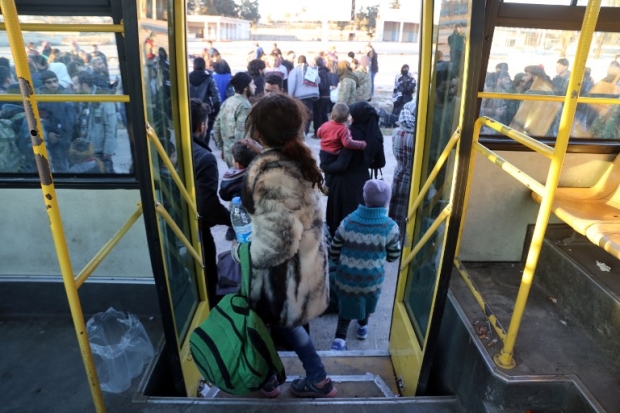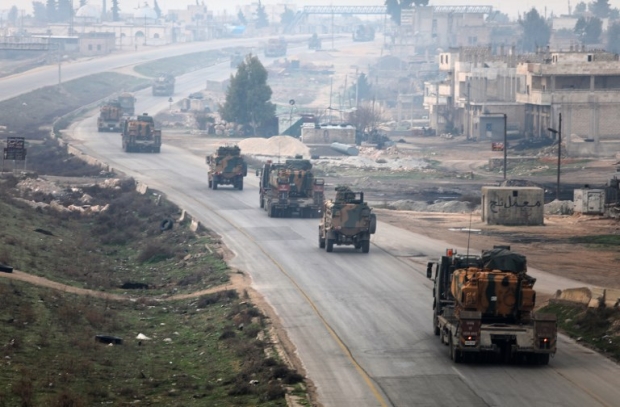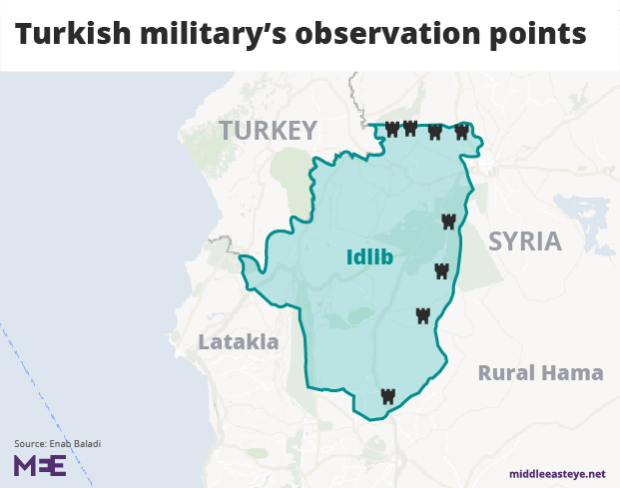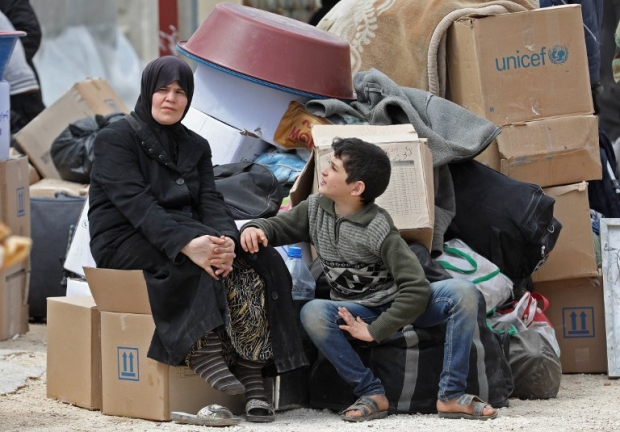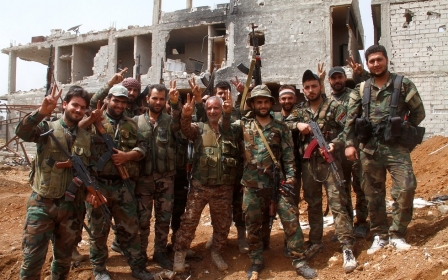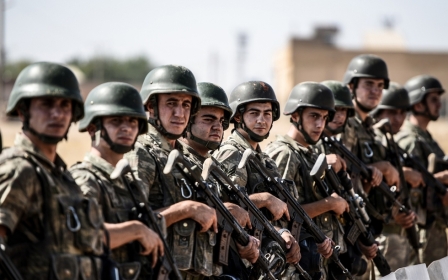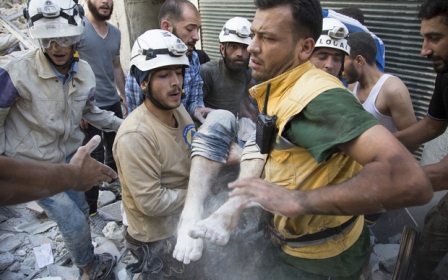Idlib, the Syrian 'death trap' now under Turkish protection
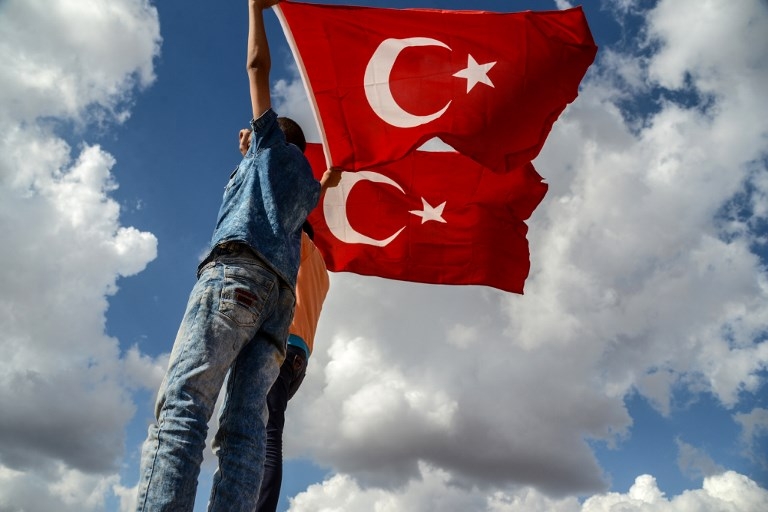
From Homs, Aleppo and Eastern Ghouta, they came in the hundreds of thousands, many of them expelled from areas besieged and routed by Syrian government forces, many arriving in the green buses that have become emblematic of their forced exodus.
Now seven years into Syria's war, 2.5 million Syrians are thought to be living in the northern Syrian province of Idlib after their evacuations from all corners of the country.
We reached a point that we can't talk badly about Turkey or criticise them for their bad behaviour
- Hamed al-Ahmad, goods supplier
The province is a so-called de-escalation zone, agreed by Iran, Turkey and Russia last May in Astana. But in recent months, residents have endured repeated government air strikes and in-fighting among rebel groups that control the area - and fully expect worse to come.
"The clear reason for stopping the attacks against us nowadays is because Assad has another mission to achieve in southern Syria," Khalid Dames, a former resident of Aleppo, now living in Idlib City told MEE.
"Whenever he finishes, he will turn his eyes toward us and here is when the tragedy will begin."
"We reached a point that we can't talk badly about Turkey or criticise them for their bad behaviour," said Hamed al-Ahmad, 36, a goods supplier in Haram, a Syrian city near the Turkish border.
"Which is like how we used to under regime rule: if you speak badly about Assad, you will be arrested."
'The Idlib issue'
Turkey entered Idlib last October, ostensibly to oust al-Qaeda-linked militants, although analysts at the time told MEE that it was Ankara's attempt to establish a sphere of influence before any serious negotiations to end the war began.
In Idlib, Turkey is able to cut off Kurds in northern Syria from gaining a clear path to the Mediterranean – or what president Recep Tayyip Erdogan described as a "terrorist corridor" when the Free Syrian Army-led offensive began.
But Erdogan more recently has said that the Idlib mission, along with Turkey's Operation Olive Branch in Afrin, also sets the stage for 3.5 million Syrian refugees to return.
"We will solve the Afrin issue, the Idlib issue and we want that our refugee brothers and sisters return to their country," he was quoted as saying in the Daily Sabah in February.
Since October, Turkey has set up six observation points around the province – but residents say in fact Ankara's imprint on the area is much more substantial.
"Things are on their way to establish a Turkish empire in north Syria where they can control both politically, economically and militarily," said Ahmad.
Ahmad, a father of two, delivers supplies to big stores around northern Syria for work and, in the past few months, he's noticed the landscape changing around him."A lot of buildings are being built every day, businesses are growing and the movement [of trade and reconstrution] generally is continuously evolving," Ahmad said.
The markets in Haram are packed with Turkish drinks, sweet and goods – which only makes sense given that Turkey is just across the border, he said.
"Flour and fruits, everything is made in Turkey, which in my point of view is better quality than we used to have before," said Dames, who fled Aleppo with his wife, Jamila, and two young sons, in December 2016 when the government took back control of the city.
'They are controlling all of the services from water, phones, electricity, fuel prices'
- Khalid Dames, geography teacher
The 35-year-old had worked as a geography teacher before fleeing and has managed to find a similar job in Idlib City where his family lives in a two-room flat.
"They are controlling all of the services from water, phones, electricity, fuel prices," he said. "A state on a border during a war has to be involved in everything inside the neighbouring country as we have an enormous effect on Turkey."
'What the Turks brought us'
But with this functionality in Syria's last rebel-held province also comes unchecked power and a return to a familiar dictatorial feel, said some residents.
"When I want to say to the bad people, whether they were armed or not, that you are corrupt, you take bribes and so, I can't anymore…they will arrest me at night in my house or in the street with a van," said Ahmad. "This is what the Turks also brought us – back to the state of fear and oppression."
Belal al-Ali, 32, and his family returned to their hometown of Al-Bab City after the Turkish military and its Syrian rebel allies took the town back from the Islamic State group last February.
Ali had been working in rural Aleppo as a carpenter and now drives a taxi. "The Turks have been helping a lot with their humanitarian activities and organisations," he said. But as time passed, they became too involved, he said.
"No one is allowed to work freely," Ali said. "Everything should pass through Turkey's authorities and no one is allowed to work unless he gets the Turk's blessing."
Others said they wished Turkey had intervened in northern Syrian sooner.
"For me, I wished when we were in Aleppo, that it had become part of Turkey completely and we became Turkish residents back then," said Dames. "But it didn't happen and we lost the city."
"We as Syrians are not eligible to run the areas we control. We have been behaving like militants who care about our own benefits," he said.
New MEE newsletter: Jerusalem Dispatch
Sign up to get the latest insights and analysis on Israel-Palestine, alongside Turkey Unpacked and other MEE newsletters
Middle East Eye delivers independent and unrivalled coverage and analysis of the Middle East, North Africa and beyond. To learn more about republishing this content and the associated fees, please fill out this form. More about MEE can be found here.


